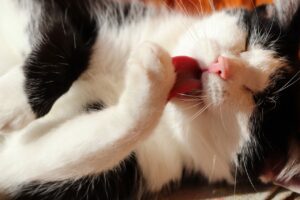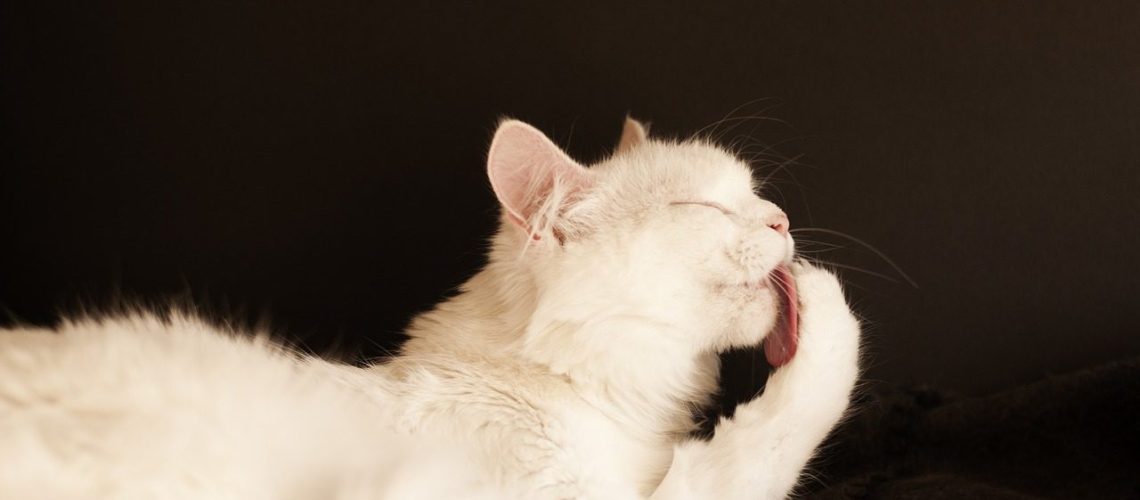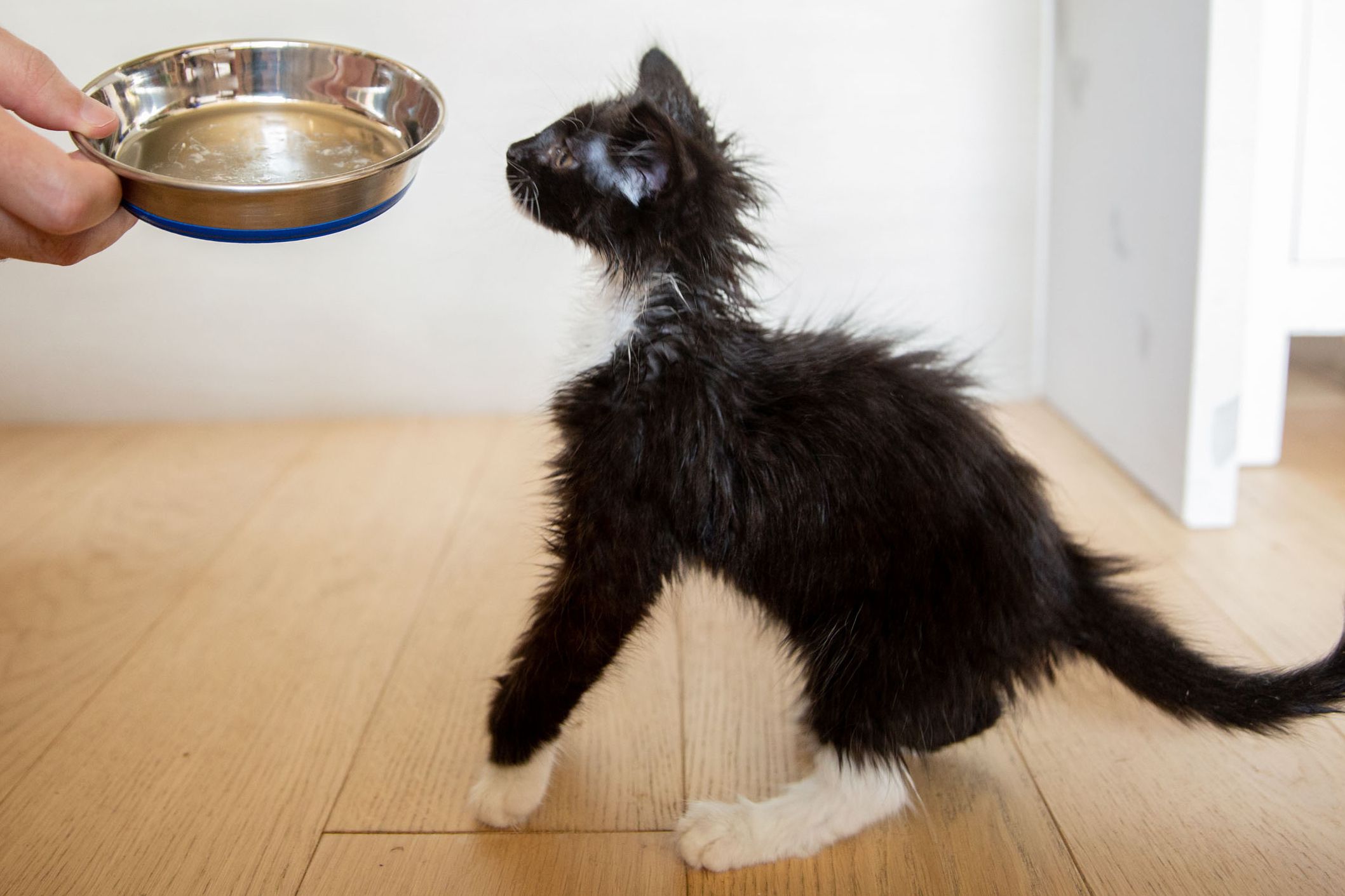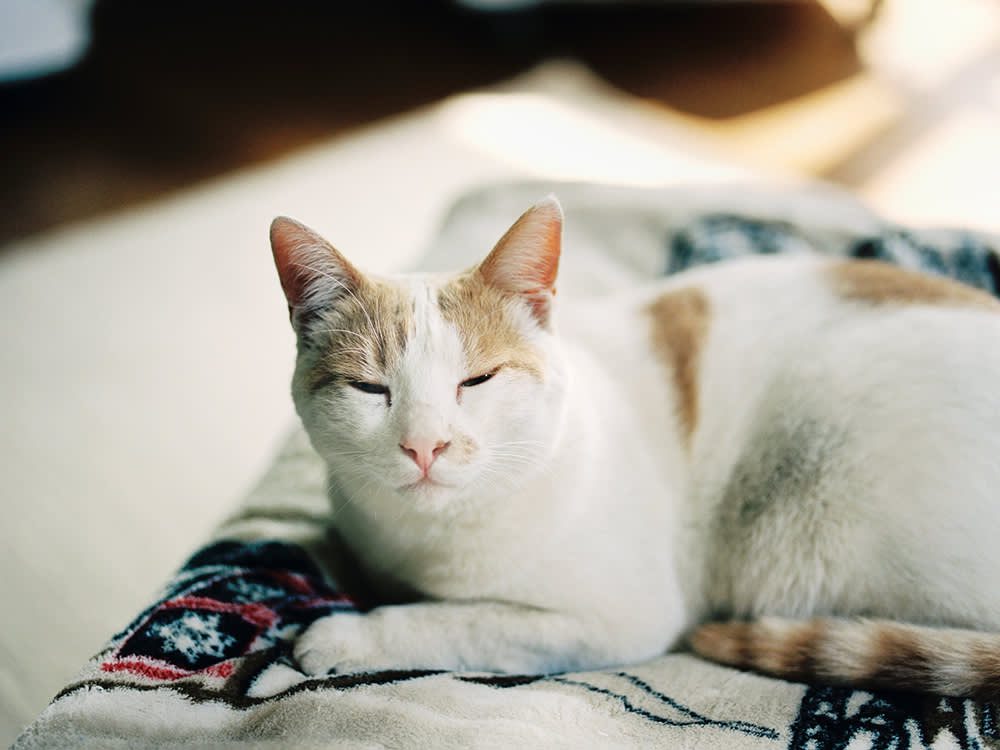Are you curious about what goes on in the mysterious world of cats after they finish their meals? If so, get ready to uncover the secrets behind their fascinating post-meal rituals. Understanding these paw-licking moments can provide valuable insights into the behavior and instincts of our feline friends. Not only will this knowledge deepen your bond with your furry companion, but it may also help you identify any potential health concerns. So, let's embark on a journey to explore the captivating world of cats' after-meal habits and discover the hidden meanings behind their actions. Get ready to be amazed by what you'll learn!
Key Takeaways:
- Cats engage in paw-licking rituals after meals to clean their paws and remove any food residue.
- This behavior is instinctual and serves as a way for cats to groom themselves and maintain their hygiene.
- Paw-licking can also be a sign of satisfaction or contentment after a meal.
- Some cats may exhibit excessive paw-licking, which could indicate an underlying health issue or anxiety.
- Observing a cat's paw-licking habits can provide insights into their overall well-being and behavior patterns.
Why do Cats Lick their Paws After Eating?
The Purpose of a Cat's Post-Meal Ritual
Have you ever wondered why your cat licks its paws after finishing a meal? Well, there's actually a good reason for this behavior. When cats lick their paws, they are engaging in a post-meal ritual that serves several purposes.
One purpose of this ritual is to clean their paws. Cats use their tongues as natural grooming tools, and by licking their paws, they can remove any food residue that may be stuck to them. This helps to keep their paws clean and free from bacteria or other contaminants.
How Licking their Paws Helps Cats Clean Themselves After a Meal
Cats have rough tongues that are covered in tiny barbs called papillae. These barbs act like miniature brushes, allowing the cat to effectively clean its fur and remove any dirt or debris. When a cat licks its paws, it is essentially using these barbs to clean not only its paws but also its face and head.
In addition to cleaning, licking also stimulates the production of saliva in cats. Saliva contains enzymes that help with digestion, so by licking their paws, cats are aiding in the breakdown of food particles that may still be present in their mouths.
Health Benefits of a Cat's Paw-Licking Moments
The act of licking their paws after eating provides some health benefits for cats. By removing any leftover food particles from their paws and mouth, cats reduce the risk of developing dental issues such as plaque buildup or gum disease. Additionally, maintaining cleanliness helps prevent infections that could arise from bacteria or other harmful substances on their paws.
This post-meal ritual also helps cats maintain a healthy coat. By regularly grooming themselves, cats distribute natural oils from their skin onto their fur, which keeps it shiny and well-moisturized. Furthermore, the act of licking stimulates blood circulation and promotes a healthy immune system.
Can a Cat's Paw-Licking Behavior Indicate Satisfaction with Their Meal?
While it's tempting to think that a cat's paw-licking behavior after eating is a sign of satisfaction with its meal, this may not always be the case. Cats have different personalities and preferences when it comes to food, so their post-meal rituals can vary.
Some cats may lick their paws as an instinctual response to clean up after eating, regardless of whether they enjoyed their meal or not. Others may engage in this behavior simply because they find it comforting or soothing. Therefore, it's important to consider other factors such as overall appetite and body language when determining if a cat is satisfied with its meal.
Variations in Post-Meal Rituals Among Cats
Just like humans have different habits and routines, cats also have variations in their post-meal rituals. While many cats will lick their paws after eating, some may engage in additional behaviors such as grooming other parts of their body or stretching.
Some cats may even prefer to groom themselves before eating rather than afterward. These variations are normal and depend on each individual cat's preferences and instincts.
Is it Normal for Cats to Spend Time Licking their Paws After Eating?
Absolutely! It is completely normal for cats to spend time licking their paws after finishing a meal. This behavior is ingrained in their nature as meticulous self-groomers. However, if you notice excessive paw-licking or any signs of discomfort or distress, it's always a good idea to consult with a veterinarian to rule out any underlying health issues.
Remember, observing and understanding your cat's behavior helps you build a stronger bond with your feline friend. So the next time you see your cat indulging in its post-meal ritual, appreciate its natural instincts and take comfort in knowing that it is taking care of itself in its own unique way.
The Purpose of a Cat's Post-Meal Ritual
After a satisfying meal, cats often engage in a post-meal ritual that involves licking their paws. This behavior serves several purposes for our feline friends. Firstly, it helps them clean any remaining food particles from their paws and face. Cats have rough tongues that act as natural brushes, allowing them to remove any traces of food that may have stuck to their fur during the meal. By meticulously grooming themselves, cats maintain their hygiene and prevent the buildup of dirt or bacteria.
Additionally, the post-meal paw-licking ritual stimulates blood circulation in a cat's paws. As they lick, they also massage their pads and claws, promoting healthy circulation and flexibility. This is particularly important for outdoor cats who rely on their paws for hunting and climbing.

Why do cats lick their paws?
Cats have scent glands located between their toes, and by licking their paws, they spread these scents onto objects or surfaces they come into contact with. This behavior serves as a way for cats to mark their territory and communicate with other felines in the area.
What are some other grooming behaviors exhibited by cats?
In addition to licking their paws after a meal, cats engage in various grooming behaviors throughout the day. They use their tongues to clean different parts of their bodies, including their fur, face, and tail. Cats are meticulous groomers and spend a significant amount of time each day ensuring that they remain clean and well-groomed.
Overall, the post-meal paw-licking ritual not only helps cats maintain cleanliness but also provides them with an opportunity to mark territory and communicate with other cats through scent marking.
How Licking Their Paws Helps Cats Clean Themselves After a Meal
When you observe your cat diligently licking their paws after a meal, you may wonder why they engage in this behavior. The act of licking plays a crucial role in a cat's self-cleaning routine.
Cats have barbed tongues that act like tiny combs. As they lick their paws, these barbs catch loose fur and debris, removing them from their coat. This grooming process helps prevent the formation of mats or tangles in their fur, ensuring that it remains smooth and healthy.
Furthermore, cats produce saliva while licking, which acts as a natural cleanser. This saliva contains enzymes that break down dirt and bacteria on their paws and fur. By spreading this saliva onto their paws and then grooming themselves, cats effectively remove any potential contaminants from their bodies.
Why do cats groom themselves so often?
Cats are known for being fastidious groomers. Grooming is not only essential for maintaining cleanliness but also serves as a way for cats to regulate body temperature. When cats lick themselves, the evaporation of saliva from their fur helps cool them down during hot weather.
What should I do if my cat's grooming habits change?
While regular grooming is normal for cats, any significant changes in grooming behavior could indicate an underlying health issue. If you notice your cat excessively licking or neglecting grooming altogether, it's important to consult with a veterinarian to rule out any medical conditions or discomfort your cat may be experiencing.
In conclusion, licking their paws after a meal allows cats to clean themselves by removing loose fur and debris while also benefiting from the natural cleansing properties of their saliva. It's an instinctive behavior deeply ingrained in our feline companions' daily routines.
Health Benefits of a Cat's Paw-Licking Moments
Cats are known for their grooming habits, and one of the behaviors they often engage in is licking their paws. While it may seem like a simple act, there are actually several health benefits associated with this behavior.
Promotes Cleanliness
When cats lick their paws, they are essentially cleaning themselves. Their tongues have tiny barbs that help remove dirt, debris, and loose fur from their fur coats. This self-grooming not only keeps them looking neat but also helps prevent skin infections and irritations.
Stimulates Blood Circulation
Licking their paws can also stimulate blood circulation in a cat's body. The motion of licking increases blood flow to the extremities, including the paws. This improved circulation can be beneficial for overall health and may help prevent certain conditions such as arthritis.
Tips for Encouraging Paw-Licking Behavior
- Provide your cat with clean and comfortable surfaces to groom on, such as soft blankets or mats.
- Regularly brush your cat's fur to minimize shedding and reduce the amount of loose hair they ingest during grooming.
- Ensure your cat has access to fresh water at all times to stay hydrated, which is important for healthy skin and coat.
Can a Cat's Paw-Licking Behavior Indicate Satisfaction with Their Meal?
If you've ever observed your cat licking its paws after a meal, you might wonder if it indicates satisfaction with their food. While it's difficult to determine exactly what goes on in a cat's mind, there are some theories that suggest paw-licking could be related to meal satisfaction.
Self-Cleaning Ritual
Cats are known for their meticulous grooming habits, and licking their paws is part of this self-cleaning ritual. After eating, cats may lick their paws to remove any food residue or smells from their fur. This behavior helps them maintain a clean and odor-free coat.
Marking Territory
Cats have scent glands in their paws, and by licking them, they may be leaving behind their unique scent as a way of marking their territory. This behavior could be an instinctual response to assert dominance or communicate with other cats in the household.
Tips for Understanding Your Cat's Behavior
- Observe your cat's overall body language and behavior to get a better understanding of its mood and satisfaction levels.
- Provide a variety of high-quality cat food options to ensure your cat's nutritional needs are met and to keep mealtime interesting for them.
- If you notice any changes in your cat's eating habits or excessive paw-licking that concerns you, consult with a veterinarian for further evaluation.
Variations in Post-Meal Rituals Among Cats
While many cats engage in paw-licking after meals, it's important to note that not all cats exhibit the same post-meal rituals. Just like humans have different preferences and behaviors, cats also have individual quirks when it comes to grooming after eating.
Paw-Wiping on Face
Some cats may prefer to wipe their paws on their face after a meal. This behavior could be an attempt to clean off any food remnants from their paws or simply a personal preference. It's important to allow cats to engage in their natural grooming behaviors as long as they are not harming themselves.
Skipping Paw-Licking Altogether
Not all cats feel the need to lick their paws after eating. Some may be satisfied with just a quick clean of their face or simply walk away from the meal without any grooming rituals. This variation in behavior is normal and should not be a cause for concern unless accompanied by other unusual symptoms.
Tips for Catering to Individual Preferences
- Observe your cat's post-meal behavior and respect their individual preferences.
- Provide appropriate grooming tools, such as a soft brush or grooming wipes, to help your cat maintain cleanliness if they don't engage in paw-licking.
- Ensure your cat has access to a quiet and comfortable space where they can groom themselves undisturbed after meals.
Is it Normal for Cats to Spend Time Licking their Paws After Eating?
If you've noticed your cat spending time licking its paws after eating, rest assured that this behavior is generally considered normal among cats. It's believed to be part of their instinctual grooming routine and serves various purposes.
Digestive Aid
Licking their paws can help stimulate digestion in cats. The act of licking activates saliva production, which contains enzymes that aid in breaking down food particles. This natural process can assist with the overall digestion and absorption of nutrients from the meal.
Cleaning Up Residual Odors
Cats have a highly developed sense of smell, and licking their paws after eating may help them remove any residual odors from their fur. By doing so, they ensure that they do not attract unwanted attention from predators or potential threats in their environment.
Tips for Promoting Healthy Post-Meal Behavior
- Provide your cat with a balanced and nutritious diet to support their overall health and well-being.
- Ensure your cat has access to clean water to stay hydrated, which can aid in digestion.
- Keep your cat's feeding area clean and free from any potential contaminants that may cause digestive issues.
In conclusion, cats have a unique ritual of licking their paws after meals. This behavior helps them clean themselves and maintain their hygiene, showing how fascinating and adorable our furry friends can be.
What does it mean when a cat licks their paws after eating?
Why do cats groom themselves after eating? Cats groom themselves after eating to remove any small bits of food and food odors from their whiskers, face, and even their front legs. Cats have a strong instinct to keep themselves clean.
Why do cats lick themselves after eating something?
Did you ever observe that your pet licks their fur after eating? This behavior is often a reaction to a survival instinct commonly seen in cats in the wild. Since cats can be both predators and prey, they have a natural tendency to remove any food scent or residue from their fur after a meal!
What does it mean when a cat keeps licking its paws?
Boredom: Similar to anxiety, cats may alleviate their boredom by excessively grooming their paws, even if it leads to hair loss. This boredom is caused by a lack of fulfilling mental and physical stimulation throughout the day.
Why is my kitten pawing at the mouth after eating?
When adult teeth start growing, kittens may have mild gingivitis, which can cause swollen gums and bad breath. Usually, this issue will go away on its own. Other signs of dental discomfort include drooling, bleeding gums, and pawing at the mouth.
Why does my cat flick his tongue after eating?
If your cat is flicking its tongue, it could be to improve its sense of smell or it could be a sign of nausea or oral discomfort. If this is a new behavior, it is recommended to take your cat to a veterinarian for further examination.
Do all cats groom after eating?
Cats are known for being clean animals and they groom themselves multiple times a day. However, it may be puzzling why cats lick their front paws after eating, even though their paws haven't come into contact with food. Despite this, all cats have a tendency to do so.

















